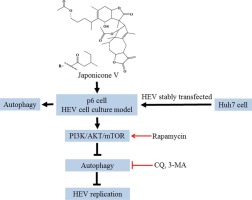Journal of Functional Foods ( IF 5.6 ) Pub Date : 2019-12-31 , DOI: 10.1016/j.jff.2019.103755 Yueliang Zhao , Mengru Tao , Ru Wang , Yuanqiang Guo , Mingfu Wang

|
Hepatitis E virus (HEV) is one of the major causes of acute hepatitis worldwide. Here, we investigated the role of autophagy on HEV replication and demonstrated anti-HEV effects of japonicone V, a main constituent of the flowers of Inula japonica. Results showed that HEV infection induced autophagy in Huh7 cells. Chloroquine (CQ) and 3-methyladenine (3-MA), two autophagy inhibitors inhibited HEV replication. Moreover, japonicone V suppressed HEV replication and inhibited autophagy in the HEV infectious model. CQ had additive inhibitory effects with japonicone V on HEV replication, while rapamycin, an autophagy inducer, attenuated japonicone V-mediated inhibition of HEV replication. In addition, HEV infection inhibited the PI3K/AKT/mTOR pathway; however, this effect could be alleviated by japonicone V treatment. Collectively, our findings reveal that autophagy machinery is required for HEV replication; japonicone V inhibited HEV replication by targeting the virus-associated autophagy, at least in part, through inhibition of the PI3K/AKT/mTOR pathway.
中文翻译:

Japonicone V是一种来自菊苣的花的倍半萜烯内酯衍生物,可通过靶向与病毒相关的自噬来抑制戊型肝炎病毒的复制
戊型肝炎病毒(HEV)是全球急性肝炎的主要原因之一。在这里,我们研究了自噬在戊型肝炎病毒复制中的作用,并证明了日本菊旋花的主要成分Japonicone V的抗HEV效应。结果显示,HEV感染可诱导Huh7细胞自噬。氯喹(CQ)和3-甲基腺嘌呤(3-MA)这两种自噬抑制剂可抑制HEV复制。此外,在HEV感染模型中,Japonicone V抑制了HEV复制并抑制了自噬。CQ与甲肝素V对HEV复制具有累加抑制作用,而自噬诱导剂雷帕霉素则减弱了甲乙酮V介导的HEV复制抑制作用。此外,HEV感染抑制了PI3K / AKT / mTOR途径。但是,通过Japonicone V处理可以减轻这种影响。总的来说,我们的发现表明,自噬机器是HEV复制所必需的。japonicone V通过至少部分地通过抑制PI3K / AKT / mTOR途径来靶向与病毒相关的自噬来抑制HEV复制。



























 京公网安备 11010802027423号
京公网安备 11010802027423号